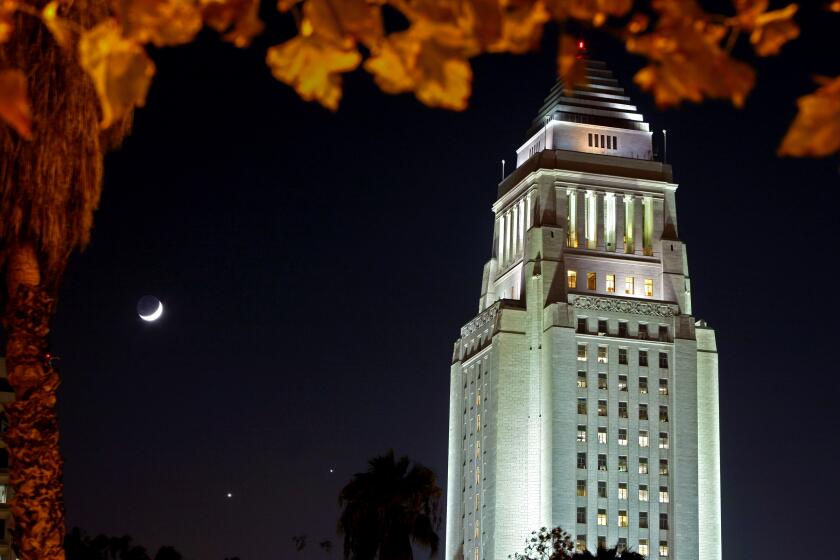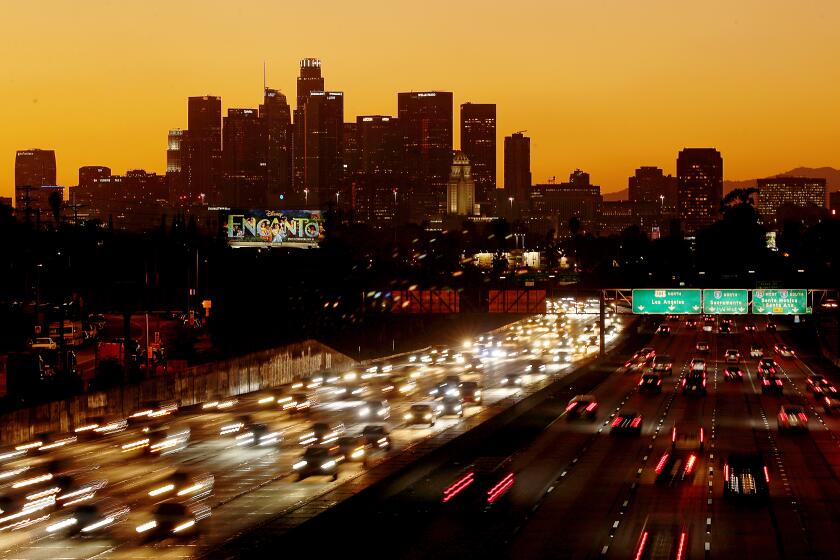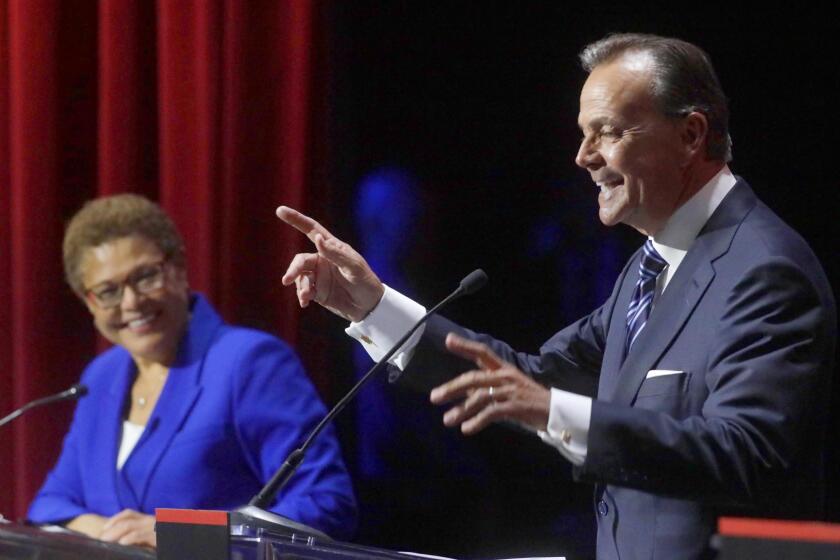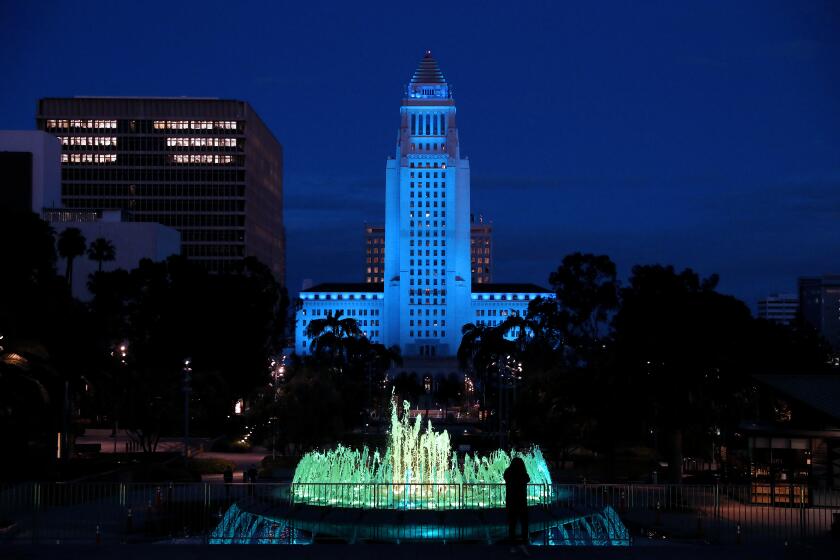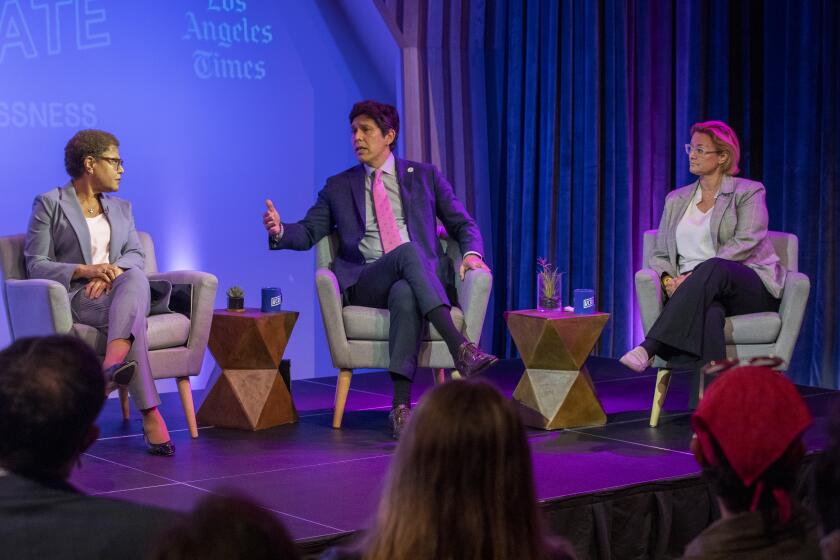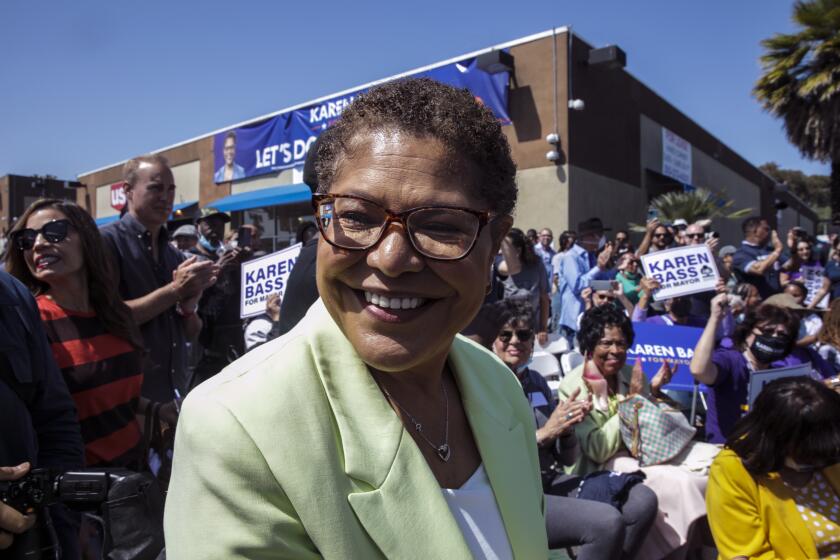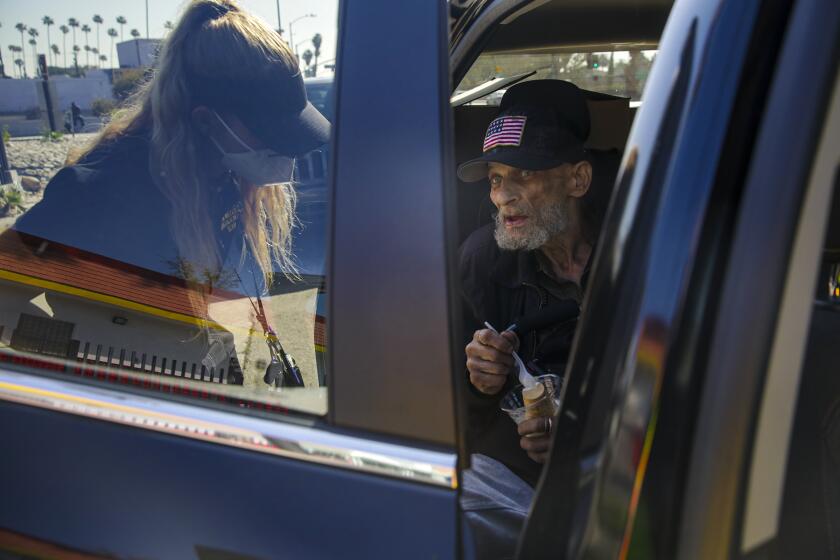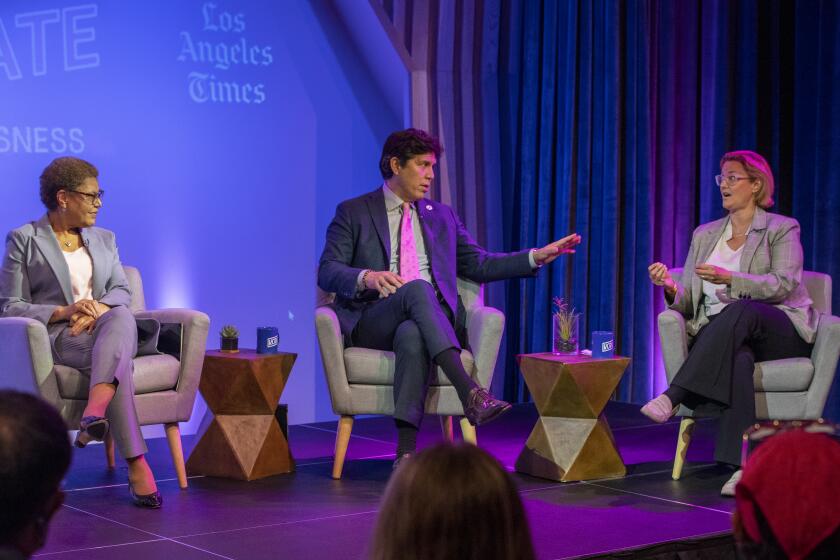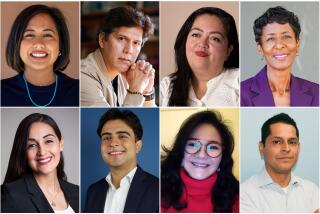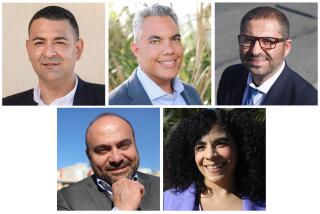2022 L.A. mayor’s race: Where Rick Caruso, Karen Bass, Kevin De Leon, Gina Viola stand on issues
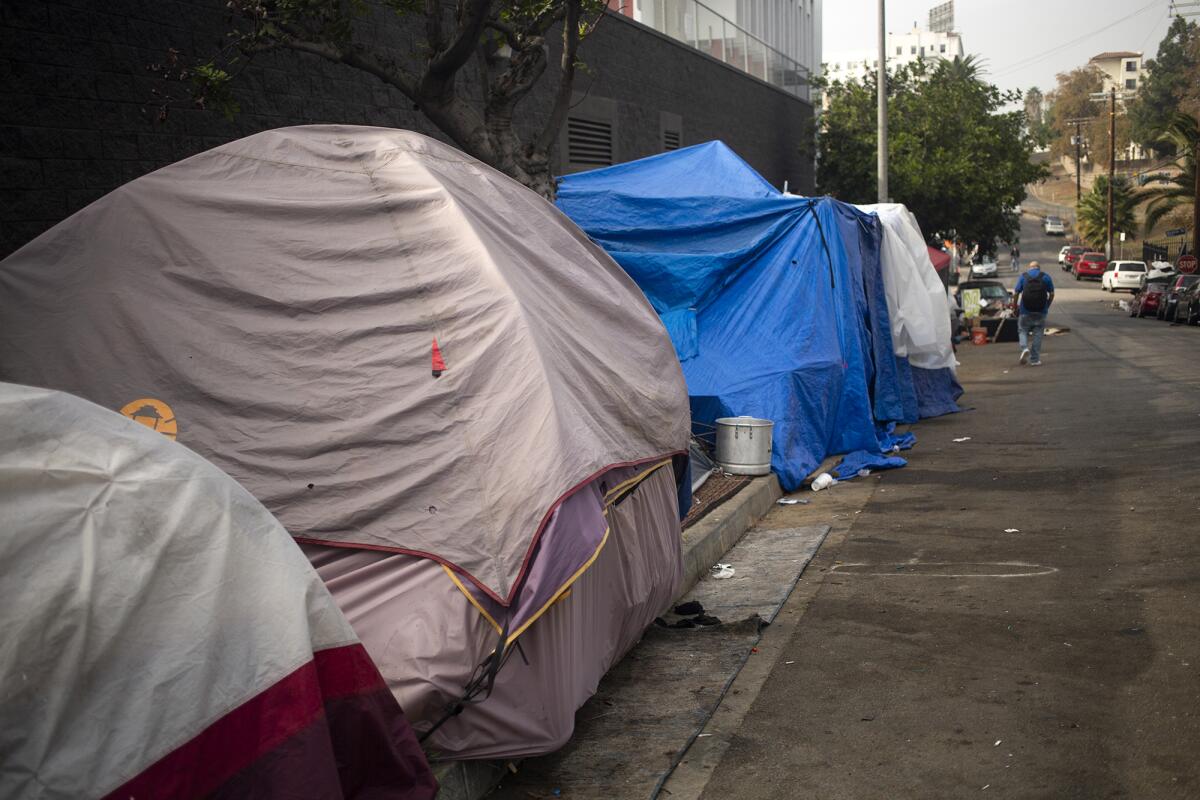
Homelessness and crime are topics of deep interest to Los Angeles voters as they elect a new mayor.
Traffic and transportation is a perennial subject of debate and griping in the land of the car.
And climate change is profoundly affecting the region, from fires to drought and water restrictions.
Polls show there are three leading contenders in the race to succeed Eric Garcetti as mayor of Los Angeles. Here’s a guide to the top contenders.
Here’s where the leading candidates for L.A. mayor stand on key issues facing the city:
Transportation
- Rep. Karen Bass says her top transportation priorities are to make trains and buses safer and more appealing. She also sees improved mass transit as a way to increase economic opportunity and reduce inequity.
- City Councilmember Kevin De LeĂłn is proposing streetcars that feed into already walkable areas like Hollywood and Koreatown, free transit for seniors and those under 25, and more frequent buses. He also wants to make buses more attractive for middle-class riders.
- Rick Caruso has in the past expressed skepticism about some of Metro’s mass transit plans. His staff declined to name which projects don’t make sense. But he has waxed publicly about his admiration for monorails.
- Gina Viola wants to see fewer traffic lanes and more investment in hydrogen fuel cell infrastructure to reduce greenhouse gases. She also wants Metro to be free for all.
The city may be the nation’s capital of car culture, but pressure is building to get more people out of their emission-spewing rides.
Policing and crime
- Caruso has promised to add 1,500 police officers and eventually expand LAPD staffing to 11,000 officers. Asked how he would achieve his plan, Caruso said in an email that he would reduce “the time it takes to vet candidates” and consider offering signing bonuses to new officers. Some are skeptical those numbers are achievable, but he insists it can happen.
- Bass has a plan to hire 250 civilian workers to handle administrative tasks currently carried out by sworn officers — a restructuring that she believes would bump up the number of officers available for patrol duties. She has also called for the development of response teams comprised of social workers, homeless outreach specialists and mental health clinicians to respond to certain situations instead of officers. She wants to bring the department to get back up to its authorized staffing of about 9,700 officers.
- De León also wants to fill LAPD positions that are currently vacant in order to bring the department’s staffing to the 9,706 officers approved under the city’s budget. He also believes LAPD reserve officers should be given a larger role as a way to bolster the department’s ranks and, has called for the creation of civilian mental health teams to respond to people in crisis, instead of officers.
- Viola is the only candidate who has vowed to reduce the size of the LAPD. She has said she will refuse to hire new officers as others retire and has discussed hiring violence prevention workers and opening academies to train locals to respond to some emergencies instead.
With Los Angeles suffering from a surge in homicides and high-profile robberies, public safety and crime are at the forefront of the city’s mayoral contest.
Many of the candidates talked about an uptick in crime during Tuesday’s debate.
Environment/climate change
- Bass supports Mayor Eric Garcetti’s goal of 100% clean electricity by 2035, 10 years ahead of state law. She hasn’t offered specifics on meeting that goal but pledged to “leverage public dollars” and create green jobs. She also called for reducing air pollution by electrifying diesel-fueled trucks and equipment at the ports of L.A. and Long Beach.
- Caruso told The Times in April he would “meaningfully move us away from our overdependence on fossil fuels and prioritize the needs of communities that have suffered the most from environmental injustice. But unlike other candidates, he declined a later interview request and has not yet released the “comprehensive climate plan” he promised.”
- De León, while serving in the California Legislature, wrote and secured passage of Senate Bill 350, requiring the state to generate half its power from renewable sources such as solar and wind by 2030. Two years later, he introduced SB 100, upping the ante to 100% climate-friendly electricity by 2045, and got it passed despite stiff opposition. He now supports 100% clean power by 2035 in L.A but beyond that hasn’t offered many specifics..
Viola has embraced the Sunrise Movement’s Green New Deal. She supports the “25x25” plan to repurpose 25% of the land area currently dedicated to driving and parking by 2025, in order to create more protected bike lanes, parks and other climate-friendly spaces.
The leading candidates have barely discussed how they would tackle the climate crisis. So we asked them.
Homelessness
- Bass has proposed 15,000 new beds for homeless people and has expressed concerns about the group-shelter model where dozens of people sleep close together in bunk beds. She hasn’t said specifically yet what kinds of housing this would be but has said she wants mix of permanent and interim solutions
- Caruso has castigated the bureaucratic system and elected leaders who he says have done little to address the crisis. He emphasizes his management experience and a desire to quickly add 30,000 housing units, many of them shelter beds.
- De LeĂłn has pushed for the city to build 25,000 units of interim and permanent housing by 2025. He has also been on a well-publicized quest to clear encampments in his council district and get people into various forms of shelter and housing.
- Viola calls for steering money away from the police to social services and for the city government to follow the example of squatters who took over homes in El Sereno, converting empty buildings into housing.
Homelessness is a huge issue in this year’s elections in Los Angeles. We invite three of the top mayoral candidates to discuss the matter.
Ballots are already arriving in Los Angeles homes ahead of the June 7 primary. Karen Bass and Rick Caruso have led the mayoral pack, with nearly 40% of likely voters undecided.
Research suggests that the type of shelters that could end up being the centerpiece of multiple candidates’ homeless plans doesn’t suit many homeless people.
L.A. mayoral candidates Karen Bass, Kevin de LeĂłn and Gina Viola presented their views on addressing homelessness in the final debate before voting ends on June 7.
More to Read
Sign up for Essential California
The most important California stories and recommendations in your inbox every morning.
You may occasionally receive promotional content from the Los Angeles Times.
